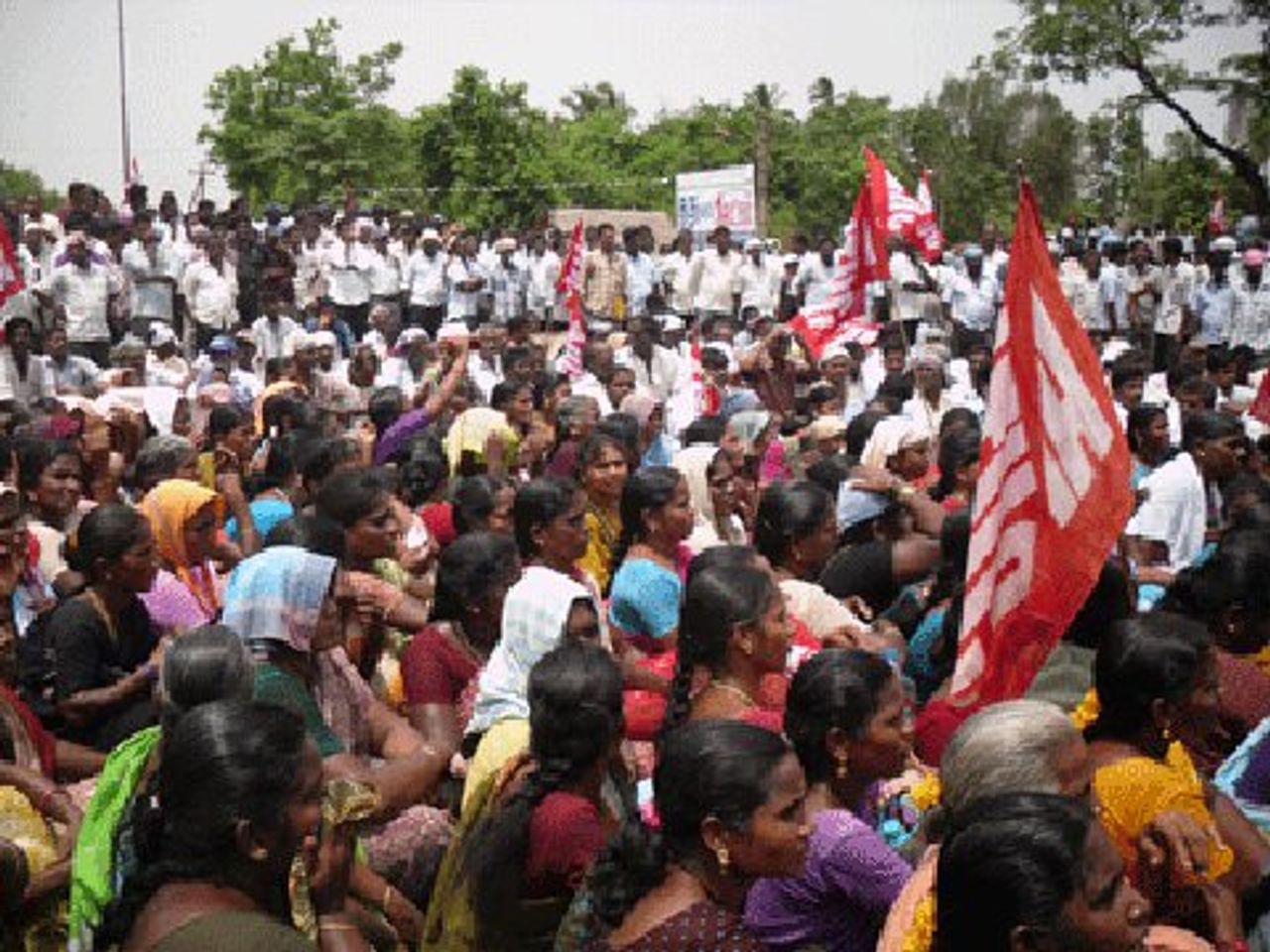Hundreds of angry contract workers from the central government-owned Neyveli Lignite Corporation (NLC) in the south Indian state of Tamil Nadu, confronted All India Trade Union Congress (AITUC) local officials yesterday over the union’s sell-out agreement to end their protracted strike.
About 14,000 NLC contract workers have been on strike since April 21 demanding equal pay with NLC permanent workers and “regularisation” of their employment. According to the agreement signed late Sunday, the AITUC agreed to end all strike action without meeting any of those demands.
NLC management has only agreed to regularise all contract workers “soon”, make 4,250 of them members of the Industrial Cooperative Society (the gateway for regularisation) after five months, and withdraw legal action against striking workers. No timeframe has been agreed for the regularisation of any contract workers and the union has completely dropped the equal pay demand.
 NLC contract workers and families at Wednesday's meeting
NLC contract workers and families at Wednesday's meetingThe company will give a “consolation” payment of 2,500 rupees ($US45) for each striking worker and monthly washing and rental allowances of 25 and 50 rupees respectively. There is no guarantee, however, that the NLC will even honour these meagre pledges. The company failed to meet “promises” made in previous union deals to end strike action in 2008 and 2010.
There is a widespread anger and opposition among contract workers over union-management deal. On Monday morning hundreds of workers mobilised at the AITUC’s local office in Neyveli denouncing the agreement.
Although contract workers were directed to resume work on Monday only a third have done so, one worker told the WSWS. Those who returned to work left the factory by noon and marched to the AITUC office, ransacked it and confronted Jeeva Contract Labourers Workers Union General Secretary K.Venkatesan over the backroom settlement.
Workers were furious that they had not been consulted before the deal was signed. One of them told the WSWS: “They are in a mood of not returning until their demands are met.”
The long-running NLC contract workers’ strike, which defied management threats, police repression and court orders declaring their walkout “illegal”, was a direct challenge to the contract labour scheme. Workers employed under this cheap labour system, which is maintained by public and private sector companies throughout India, only receive a fraction of the wages paid to permanent employees.
NLC contract workers demonstrated their determination to fight. But the dominant AITUC, the union federation of the Stalinist Communist Party of India (CPI), did everything to isolate and discourage workers as it prepared its latest betrayal. The AITUC made no call for NLC permanent workers to join the walkout and promoted the illusion that the Tamil Nadu state government of Chief Minister J. Jayalalithaa would intervene in support of the striking workers.
Addressing a rally of striking NLC workers and their family members on May 30, CPI Tamil Nadu state secretary T. Pandian issued a pathetic appeal to “Amma” (“mother”—i.e., Jayalalithaa) to help settle the dispute. He slavishly insisted that the chief minister had instituted “various good schemes for the people of Tamil Nadu” and could intervene to meet workers’ demands.
Pandian’s claims are bogus. Jayalalithaa’s government, in fact, has “intervened” in the dispute, mobilising the police to arrest protesting NLC strikers. Her administration is notorious for its attacks on workers and the rural poor, including the mass sacking of 13,000 state welfare workers, the brutal suppression of anti-nuclear protesters at Kudankulam and prices hikes for bus fares, milk and other necessities. In 2003, Jayalalithaa’s administration sacked nearly 200,000 striking public sector workers and hired strike-breakers to replace them.
Unless the strike is resolved in the next few days, Pandian rhetorically, declared: “We will change this dispute into a state-wide struggle. We will join hands with all trade unions and make it a struggle of the people of Tamil Nadu.” Four days later, the AITUC, his party’s union federation, went behind the backs of workers and signed a deal to shut down the dispute.
The Communist Party of India (Marxist) or CPM, the other Indian Stalinist party, and its Centre of Indian Trade Unions (CITU), collaborated with the AITUC bureaucrats in the betrayal.
Now posturing as opponents of the agreement, the CITU and several other unions, including the Labour Progressive Front, which is affiliated to the DMK (Dravida Munnetra Kazhagam) party of former Tamil Nadu Chief Minister M. Karunanidhi, organised a meeting of contract workers on Monday evening.
Having tacitly supported for the CPI/AITUC’s isolation of the striking workers, the CITU is attempting to contain and stifle anger over the sell-out.
WSWS supporters in India have intervened throughout the NLC strike to expose the exposed the treacherous role of the AITUC. The WSWS has insisted that workers had to break from the unions, form their own rank-and-file committees and turn out to other sections of workers on the basis of the fight for socialist policies and a workers’ and peasants’ government.
One worker told the WSWS: “The general mood among workers is high disappointment and anger, not only against the NLC management but also against the AITUC leaders.
“Housewives who also participated in recent agitation along with contract workers are very upset and annoyed about the settlement. They think it’s like throwing dust in our eyes. They want to know why was there such a rush to wind up the strike without winning their main demands, a strike that continued for 44 days despite the economic hardship suffered by contract workers and their families.
“There’s not even a pittance of a wage hike in this settlement,” he said, also rejecting the so-called “promise” to regularise contract workers. “We heard these promises in 2008 only to be forgotten and ignored in the following four years. Should we go on strike again after five months to demand the implementation of this promise?”
